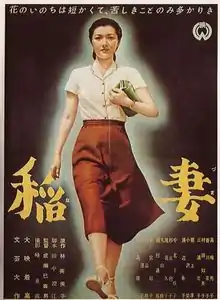Lightning (1952 film)
Lightning (稲妻, Inazuma) is a 1952 Japanese drama film directed by Mikio Naruse. It is based on the 1936 novel by Fumiko Hayashi.
| Lightning 稲妻 Inazuma | |
|---|---|
 Japanese movie poster | |
| Directed by | Mikio Naruse |
| Written by |
|
| Starring |
|
| Music by | Ichirō Saitō |
| Cinematography | Shigeyoshi Mine |
| Edited by | Toyo Suzuki |
Production company | |
| Distributed by | Daiei Film |
Release date |
|
Running time | 87 |
| Country | Japan |
| Language | Japanese |
Plot
23-year-old Kiyoko works as a tour guide in Tokyo and lives with her single mother and her three older adult siblings, all from different fathers. Her brother Kasuke is an unemployed war veteran and, while everyone in her family pushes Kiyoko to find a man to marry, there is little pressure on him to find a wife. Her oldest sister Nuiko, married to Ryuzo, wants Kiyoko to date the baker Tsunakichi, who secretly is her own lover. From her siblings, Kiyoko is closest to her sister Mitsuko. When Rohei, Mitsuko's husband, dies, his mistress and her newborn child come to the house to ask Mitsuko for money from her husband's life insurance. Also Nuiko, Kasuke and the mother want to borrow money from Mitsuko for their own pursuits. Mitsuko eventually decides to use the money partly for her husband's illegitimate son and for opening up her own coffee shop.
Kiyoko becomes frustrated with the tensions in her family and being pushed to date Tsunakichi, in whom she is not interested at all. She moves out into a flat of her own, where she becomes acquainted with Shuzo and Tsubomi, a brother and sister her age living next door. Kiyoko slowly develops an interest in Shuzo, who is a pianist. Although feeling sad over having left the family, she feels like it was the right thing to do. When her mother comes to look for the missing Mitsuko at Kiyoko's place, they have an argument about the many fathers Kiyoko grew up with and start crying, while a thunderstorm passes by. Afterwards, Kiyoko offers to buy her mother new summer clothes and walks her home.
Cast
- Hideko Takamine as Kiyoko
- Mitsuko Miura as Mitsuko
- Chieko Murata as Nuiko
- Chieko Nakakita as Ritsu
- Kenzaburo Uemura as Ryuzo
- Kyōko Kagawa as Tsubomi
- Jun Negami as Shuzo
- Sakae Ozawa as Tsunakichi
- Maruyama Osa as Kasuke
Awards and legacy
Lightning won the 1952 Blue Ribbon Award for Best Film, Best Director (Mikio Naruse) and Best Supporting Actress (Chieko Nakakita).[2] It was also awarded the 1952 Mainichi Film Concours for the best film score by Ichirō Saitō and again for Best Supporting Actress (Chieko Nakakita).[3]
Film historian Donald Richie called Lightning an "almost perfect realization of Fumiko Hayashi's novel" and "a balanced union of literature and cinema".[4]
References
- (in Japanese) http://www.jmdb.ne.jp/1952/cb002190.htm accessed 13 June 2009
- "Blue Ribbon Awards 1952 (official site)" (in Japanese). Archived from the original on 30 November 2012. Retrieved 20 January 2021.
- "Mainichi Awards 1952 (official site)" (in Japanese). Retrieved 20 January 2021.
- Anderson, Joseph L.; Richie, Donald (1959). The Japanese Film – Art & Industry. Rutland, Vermont and Tokyo: Charles E. Tuttle Company.
External links
| Wikimedia Commons has media related to Lightning (film). |
- Lightning at IMDb
- Lightning at the Japanese Movie Database (in Japanese)